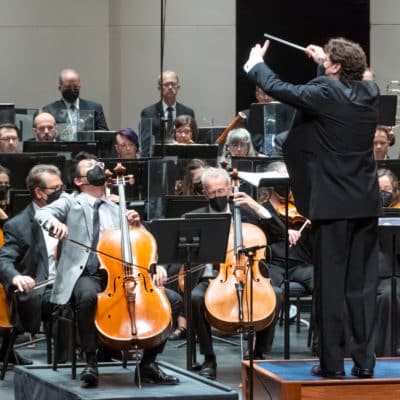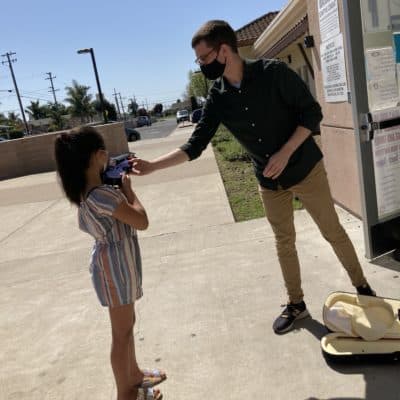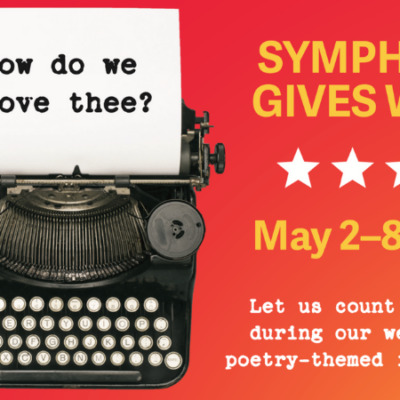Christine Keller has taught at the Sound Minds music education program and other California Symphony education initiatives for more than two decades. In addition to being a teacher, Christine is a professional pianist and one half of the “Keller Duo” with her concert pianist mom, Alice Mae Keller, who has been struggling with dementia since 2001. She shares her story with us for World Alzheimer’s Day, September 21, 2018.
California Symphony: You and your mother are both classically trained pianists. Together you formed “The Keller Duo”, and you performed professionally around the Bay Area. How did you come to create the act, and what was it like working with your mother?
Christine Keller: In 1996, I won the Berkeley Piano Club competition and spent the spring practicing and preparing for the winner’s concert. Unfortunately, after that I was out of money, and had to find a job. I began teaching at Music Time, a music school for small children, through which I eventually got a job with the California Symphony. Too busy to follow a concert career at the time, I accepted my mother’s proposal to become her duo piano partner, and we became a team, the Keller Duo.
Of course, at the beginning, there were a lot of mother-daughter issues that came up, and eventually we found an elegant solution. Using humor to dissolve the occasional tension between us, we developed a deep respect for one another, not only as musicians, but as friends. Somehow, being at the piano(s) became a safe place to tell each other the truth, no matter how difficult that might be, and sometimes it was quite revealing. We performed around the Bay Area, mostly at Berkeley Piano Club and Performing Arts Society. Dad coached us as we were preparing for concerts, and turned pages for us at performances.

How many years did you perform together? When was your most recent performance?
We have performed every year since 1996, except when I injured my shoulder and couldn’t play with her from 2005 until 2009. That makes 28 years playing together!
Our last performance was June 6, 2018 at Berkeley Piano Club.
Mom turned 88 this year, exactly the same number of keys there are on a piano. Together we bring 136 years of playing the piano to our performances!
Your mother has been suffering from dementia for a long time but you say that playing the piano together is something that has helped keep her brain active and has kept her engaged with you. How do you think music helps?
Mom has been struggling with dementia since 2001, when she had two operations within a week of each other. The anesthetic was toxic to her brain, as it is for many people. Playing music is something that gives her a sense of value. Preparing for the concerts allows her to feel important and have a goal to accomplish. She still sight reads, and though she can no longer tell you how many sharps are in the key of A major, she can still process that information and play it.
We even have a piece that shifts from A major (with three sharps) to A flat major (with four flats.) The notes look exactly the same on the page, but you have to play all of the notes differently because of the key change. With a little coaching, she can still do it. She is losing the connection between words and things, but she can still play piano!
About five or six years ago, we were invited to perform on the concert series for Rossmoor. Before the concert, when Dad left the house for any length of time she became very anxious because she didn’t know where he was. After a couple of weeks of four hours practicing a day, right before the concert, she could remember that he was out shopping and that he would come home safely to her. It extended my father’s ability to be independent for several years afterwards, a profound improvement for them both.
How is your mom doing now? Are you still playing together?
Mom is slipping deeper and deeper into Alzheimer’s now. The other day I asked her to help me clear the table and bring the cups into the kitchen. She just stood there, so I asked her a couple more times, getting more exasperated each time. When she didn’t bring them, I looked at her face, and saw she was very confused. She looked at me and said, “What’s a cup?”
It’s an extraordinary opportunity to be with a woman whose brain no longer allows her to engage the world easily, nor even make a full sentence most of the time—other than “You’re wonderful!” or “We’re having a good time, aren’t we?” But she can sit down at the piano and play music with me. Sometimes she even corrects my sight reading, telling me I am not observing a dynamic marking! After so many years playing with each other, it is such a delight to drop into this familiar and rare opportunity to play piano with my mother, still making really beautiful music together!
You currently teach students in the Sound Minds program at Downer Elementary School. Does your experience of working with your mom impact how you teach the kids?
My musicality, attention to detail, and the sheer pleasure of polishing a piece so it shimmers, I learned from her. I bring all of that to my work with the students. All of the patience and teaching strategies I use with the Sound Minds students have come full circle, as I draw on them when I sit at the piano with my mother, because her mind is functioning as a toddler now. But beyond that, at the piano, playing music together, she is still the extraordinary musician who was on the radio playing piano at age 11.
Any final thoughts you’d like to share?
My mom has been my musical mentor, inspiration, and wonderful companion at the piano for my entire life. Playing music together allows me to continue a meaningful relationship with her now, even as her mental capacity dwindles.
I believe making music together with my mom is one of the most important things I’ve done in my life, and I encourage every parent who has a musical child to share music-making with them!
Finally, I’d also like to acknowledge my dad, Richard Keller, for his support, keen musical insight and encouragement, especially these last few years. Without his loving attention, Mom wouldn’t be where she is today.



